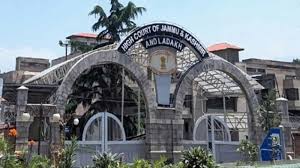‘Narcotics as terror currency is new proxy war’: Jammu and Kashmir HC denies bail to juvenile

Srinagar, July 17 – The Jammu and Kashmir High Court has denied bail to a juvenile accused of drug smuggling. The court said narcotics are now being used as a weapon in a new kind of proxy war. The judgment marks a shift in how the judiciary views drug trafficking in the region.
Justice Sanjay Dhar, who passed the order, called narco-terrorism a serious national security threat. He stated that drugs entering India from across the border aren’t just criminal items—they fund and fuel terrorism.
The Case: Juvenile Held for Drug Smuggling
Police arrested the minor after they found him transporting a large quantity of illegal drugs. His lawyer requested bail under the Juvenile Justice Act. The defense argued that the law calls for care and rehabilitation—not jail—for minors.
But the High Court disagreed. Justice Dhar noted that the law allows denial of bail in serious cases. If a juvenile poses a threat to society or national security, the court can refuse bail.
“Courts cannot ignore the bigger picture,” the judge said. “Juveniles used in such operations serve dangerous agendas.”
Narcotics as a Weapon of War
Justice Dhar emphasized that terrorists now use narcotics to wage war against India. “This is not just a drug case,” he wrote. “It’s a method to destabilize society and harm national interests.”
He explained how drug money supports terror outfits. These groups push narcotics into India and use the profits to fund violence. The aim is to weaken youth and disturb peace.
When Juvenile Law Meets Terror Risk
India’s laws protect minors, focusing on reform rather than punishment. But the court made it clear: security concerns can override this protection. A juvenile involved in terror-linked crimes cannot expect automatic leniency.
Legal experts say this judgment may change how courts treat such cases. In high-risk regions like Jammu and Kashmir, even minors may face tough scrutiny.
Advocate Shakeel Ahmad, a criminal lawyer in Srinagar, said, “The law must evolve with new threats. If terrorists use children, courts must respond firmly.”
Growing Drug Problem in Kashmir
Over the last few years, Kashmir has seen a rise in drug-related crimes. Authorities blame Pakistan-backed groups for pushing narcotics across the border.
According to the Anti-Narcotics Task Force, cases involving heroin and synthetic drugs have increased sharply. Areas like Kupwara, Baramulla, and Samba have seen frequent seizures.
Police have arrested several youths acting as carriers. Many of them confessed to being paid by handlers with ties to cross-border networks.
Link Between Drugs and Terror
Agencies like the Narcotics Control Bureau (NCB) and National Investigation Agency (NIA) say drug trafficking and terrorism now go hand-in-hand. Drug profits are used to buy arms, fund terror camps, and recruit new members.
In recent operations, agencies found drugs packed with codes linked to terror groups. Some smugglers even carried weapons along with the narcotics.
This confirms what the court stated—narco-terrorism is real, and it’s a growing threat.
Are These Youth Victims or Culprits?
This case raises a complex question. Are minors used as pawns, or do they knowingly take part?
Sociologist Professor Aijaz Shah believes both can be true. “Some youths are trapped due to poverty or peer pressure. But others join for fast money and status,” he said. “Each case must be examined closely.”
Justice Dhar’s judgment reflects this idea. He said the law must protect society first. If a juvenile knowingly supports terrorism, the law cannot treat him as innocent.
Government’s Response to Narco-Terrorism
The Union Home Ministry has taken steps to control the drug flow. Border forces have improved surveillance. Agencies now share data more actively.
In addition, awareness programs in schools and colleges aim to stop youth from falling into the drug trap. NGOs and local leaders are helping in high-risk areas.
Still, experts believe more needs to be done. Cutting off drug funding to terror groups must become a top priority.
A Turning Point in Legal Policy?
This case may influence how courts handle future cases involving minors and national security. It shows the judiciary’s intent to match laws with modern challenges.
The court’s firm stance sends a clear message: terrorism, even in disguise, will not find soft corners in the justice system.
While juvenile laws will continue to protect children in need, they won’t shield those who threaten the country.






